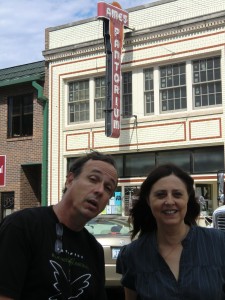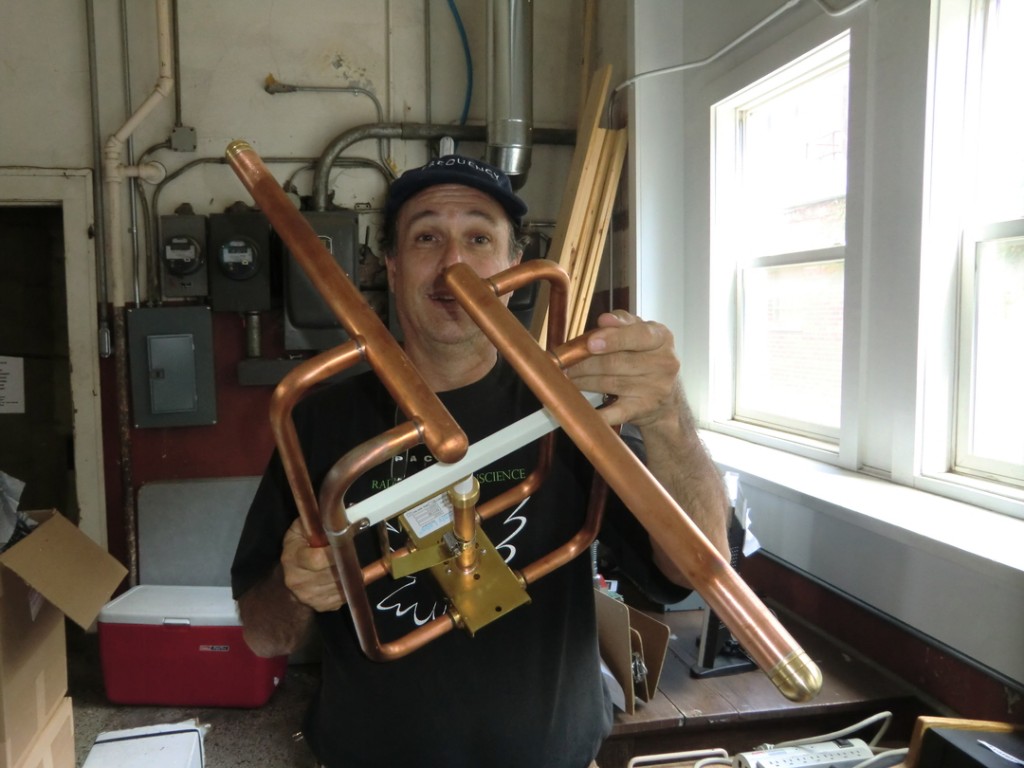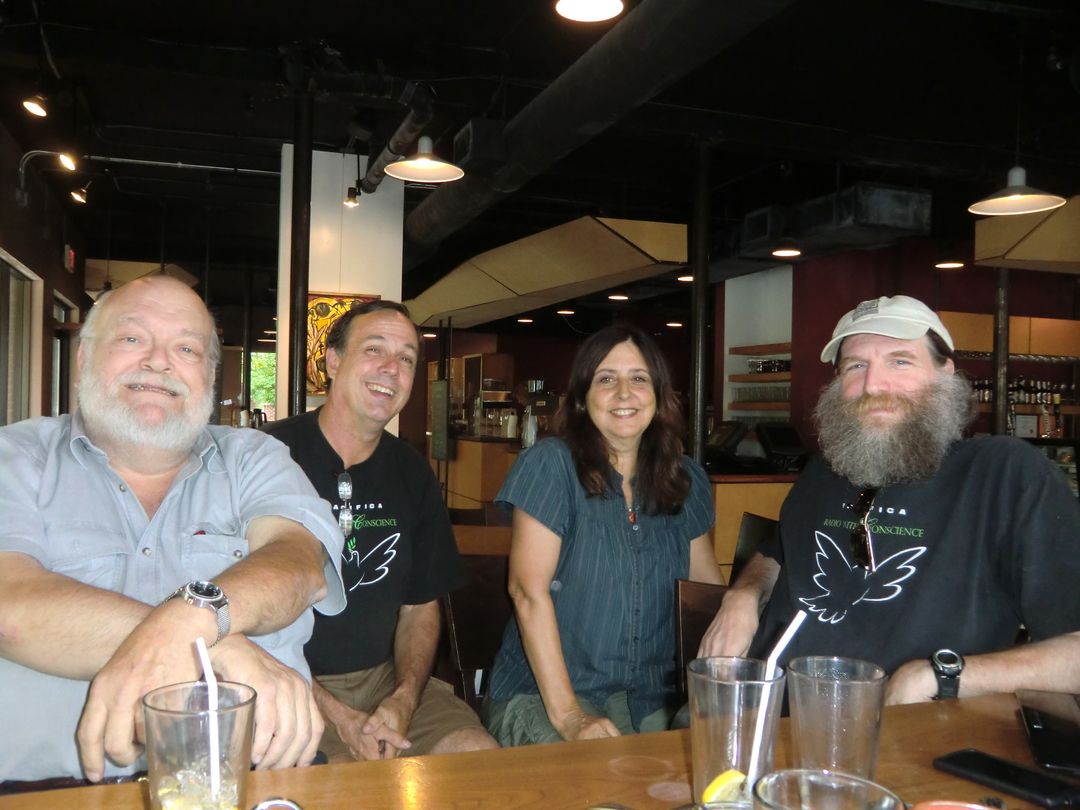
Ellinger, left, with Pacifica Affiliate Network Director Ursula Ruedenberg in front of KHOI in Ames, IA.
This month, community radio advocacy group Austin Airwaves, having waited seven years and eight months, finally received FCC licensing to construct a 5,000-watt non-commercial FM radio station in Ellinger, Texas.
Jim Ellinger is a dedicated community radio activist and founding member of Austin Airwaves. Last week, Ellinger—yes, he shares his name with the town of license—talked with Diane Reinhardt of the Pacifica Affiliate Network about the significance of this licensing, and also about his organization’s work, the station that will be founded, and the story behind the long application ordeal.
This interview has been edited and condensed.
What is the significance of this licensing?
Austin Airwave’s goal is always to provide new local service so that communities can speak for themselves and to themselves. On June 14, our Board again approved our long-term goal to, over time, transfer the license from Austin Airwaves to a new local non-profit group.
This station will fill the public radio gap between Houston and Austin. Ellinger is a small unincorporated town. There is no mayor; there is no government. Currently, there is no public radio or community radio of any sort there.
One of our competitors was the University of Texas in Austin, but our signal was a little better due to the odd nuances of who qualifies as best. We could provide the most first-time service for non-commercial radio. Where there is no community radio or public radio, anybody in that area is considered new. We had the most: 100%.
Austin Airwaves has been waiting all these years, and now finally we get what appears to be the last full-power non-commercial license for Texas forever.
What happens next?
We’re going to have a meeting there on July 16, in which we’ll announce to the people of Fayette County—the people of Ellinger, LaGrange, Columbus—that Austin Airwaves has won a license to construct a station for their area and that we intend to assist them in funding it, building it, and operating it, and that, if they do, we’ll give them the license. Then, hopefully that’s followed by a nice round of applause.
To reach that goal, there will be many, many benchmarks. We’ll make sure that there is a responsible non-profit group there. One of the main benchmarks will be putting the station on the air. We’re going to be giving this license away—after seven years and about $10,000. So, the organization must put the station on the air and operate it. Then, within a year of that, we’ll transfer the license.
 “We don’t take money; we actually refuse money from local people. We don’t want to get the rep that we’re coming down there asking for money.”
“We don’t take money; we actually refuse money from local people. We don’t want to get the rep that we’re coming down there asking for money.”
First, we’ll be building good will and trust. Many regular, conservative, older, white Texans don’t like the stereotypical image they have of Austin. They don’t want some fast-talking liberal coming down there, telling them what to do. So we’ve built some trust, we’ve made some allies.
We’ve already had two big meetings—about 30 people—though it’s sort of been putting the cart before the horse. Now that we have the license and there’s no appeal, we’re in a stronger position. One guy already said, “Why don’t you just make us the Board and get things going?” I like that. A couple of guys offered to cut checks right there. But we don’t take money; we actually refuse money from local people. We don’t want to get the rep that we’re coming down there asking for money.
The studios and offices will be in LaGrange, the county seat for Fayette County, about twelve miles northwest of Ellinger. There’s a terrific music venue in LaGrange called The Bugle Boy, run by a wonderful woman named Lane Gosnay. She and her partner have been our strongest allies—they even purchased a house next door to The Bugle Boy, and that’s where the radio station will be located. That’s a pretty serious statement of support.
What is the history of Austin Airwaves?
Many of our group members share a common background in community radio, specifically from KOPN in Columbia, Missouri, and KAZI and KOOP, both in Austin. After leaving those stations, we started Austin Airwaves.
We’re an independent non-profit. We’re not a radio station, and we’re not really a member organization. We’re just a group that meets as needed: a Board of Directors, a couple of lawyers, a whole lot of engineers. We have a loose-knit collective of engineers we sometimes refer to as “The Austin Airwaves Engineering Department.”
In recent years, we have made a name for ourselves for assisting community groups either getting or retaining or saving their licenses, but most notably for helping groups in disasters. Our most famous project to date was creating the Astrodome radio following the Katrina disaster. We, despite considerable opposition from local Republican operatives in Houston, were able to get an emergency experimental license to broadcast information to the 25,000 evacuees who found themselves inside the Houston Astrodome. Really nothing like that had ever been done before.
Since then, we have put radio stations or assisted stations on the air in New Orleans, in Borneo, in Haiti following the earthquake, in Ghana, and other countries around the world. When the LPFM window opened, Austin Airwaves helped approximately half a dozen local groups in partnership with other like-minded groups such as Common Frequency and the Prometheus Radio Project.
Why did this licensing take so long?
In October 2007, the FCC announced what we describe as “the last call;” that is, if you wanted to apply for a new full-power non-commercial FM radio station anywhere in the United States, you had until the end of October 2007 to do so…and about 3,000 groups applied for licenses in this last window.
Austin Airwaves faced 25 competing applicants. Fayette County is the empty spot between Houston and Austin. 24 of our competitors were religious groups, fundamental, Christian, conservative. Most of these stations don’t provide any local programming whatsoever. In fact, they’re satellite-fed, and satellite-fed stations and translators have been a big issue for supporters of community radio. Our engineers and lawyers, after some research, knocked 22 or 23 out of the box. Some of them were from Hawaii and Idaho. We were left with one last competitor.
And then the FCC made an astounding mistake. They claimed, in dismissing our application, that somehow our station would interfere with an existing radio station in Alamogordo, New Mexico, 900 kilometers away—a physically impossible act!
But there it sat. Our application was denied. We had to file a motion to dismiss, and that took years. We don’t know if they were embarrassed by the mistake.
Finally, this month, the FCC said, “You’re right; Alamogordo is a long way from Texas. You win.” So, we waited approximately 7 years, 8 months and 4 days just to get the darn license.
And now we begin the arduous project of raising the funds, building a new group and building a completely new full-power FM radio station in a small town in Texas, which, in all likelihood, will be the last new full-power public radio station in the Lone Star state…forever.

L to R: Paul Nelson of KHOI in Ames, IA, Ellinger, Ruedenberg, and Norm Stockwell of WORT in Madison, WI.
Last question: How did you end up with a license for a city that shares your name?
Back in 2007, the engineer, the attorney, and a couple of my staff members were on a conference call to go through a list of little central Texas towns to see if any of them within a hundred miles of Austin would be eligible for a new non-com FM. So, we went through the list, and the engineer goes: the first one, no, too close to Mexico; next one, no, too close to the big city; nope.
Finally, we got down to the last one, and the engineer rather famously quipped, “I’m sorry. What did you say your last name was again, sir?” I said, “Jim Ellinger,” and he goes, “Well, I have the most remarkable coincidence to report: You can apply for a radio license in Ellinger, Texas.” Thus, it was born.
